| Reviews & Columns |
|
Reviews DVD TV on DVD Blu-ray 4K UHD International DVDs In Theaters Reviews by Studio Video Games Features Collector Series DVDs Easter Egg Database Interviews DVD Talk Radio Feature Articles Columns Anime Talk DVD Savant Horror DVDs The M.O.D. Squad Art House HD Talk Silent DVD
|
DVD Talk Forum |
|
|
| Resources |
|
DVD Price Search Customer Service #'s RCE Info Links |
|
Columns
|
|
|
Corky (Warner Archive Collection)
One long, downbeat descent into the void. Warner Bros.' Archive Collection line of hard-to-find library and cult titles has dug up a real obscure one this time (and that's what we like): producer Bruce Geller's Corky, the 1972 Southern-fried stock car racing drama from Metro-Goldwyn-Mayer, starring Robert Blake, Charlotte Rampling (uh...yep), Patrick O'Neal, Christopher Connelly, Ben Johnson, Laurence Luckinbill, Paul Stevens, and Pamela Payton-Wright, with NASCAR gods Bobby Allison, Donnie Allison, Buddy Baker, and Cale Yarborough making "blink and you'll miss them" cameos (Richard Petty is credited, too...but only his picture shows up here, as far as I can tell). One of the notorious hack jobs personally perpetrated, many say, by then-M-G-M head honcho James Aubrey, Corky had a messy, protracted post-production that, over a year after it was shot, resulted in it being dumped into drive-ins and grindhouses, where it disappeared without a trace. Seen today, regardless of the mangling, it's a convincingly dour--if ultimately somewhat shallow--nightmare, with a full-throttled, admirably unlikable performance by Robert Blake. An original trailer is included in this remarkably spic 'n' span anamorphically-enhanced widescreen transfer.
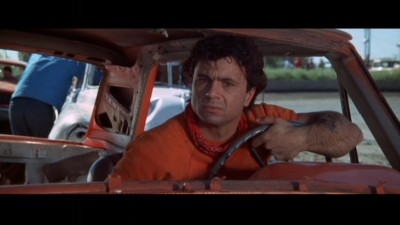
Preening, strutting Texas mighty mite Corky Curtiss (Robert Blake), lowly car mechanic by day and two-bit punk driver on the weekends, just knows he's one race away from hitting the big time stock car circuit. He just knows it...even if he never seems to finish first anymore. Now, it doesn't matter to him that he's got a reputation for dangerous driving on the track--reckless driving that costs his boss and small-potatoes sponsor, Randy Dover (Patrick O'Neal), plenty of hard-earned cash every time Corky blows up another one of Dover's engines. Nor does Corky seem to care too terribly much about any misgivings his pretty young wife, Peggy Jo (Charlotte Rampling), may have about his next-to-impossible career choice. He can always sweet-talk her out of any doubts. So when Dover finally decides that Corky is all mouth and no action after his third-straight third-place finish, Corky can't believe he's been demoted by Dover to back-up driver, while co-worker Steve Tunder (John Gruber) gets top slot. Well...Corky's going to fix that. Calling up an old friend, Corky wrangles a car in an upcoming figure 8 race, and engineers it (he fakes a popped hood) so that he can T-bone Steve, putting him the hospital. Randy knows exactly what Corky did; he decks the sawed-off hotshot and fires him from his mechanic's job. Unable to face this latest set-back, Corky ups and leaves a bewildered, frightened Peggy Jo and their two young sons, without any financial support, before drunkenly stopping by his friend and co-worker Billy's (Christopher Connelly) place to head off on a road trip to NASCAR glory in Atlanta. There's only one small problem: about the only thing Corky has is his cherry 383ci 4 speed George Barris Customs Shop 1967 Plymouth Barracuda SXB Formula S Fastback. So, he's going to have to earn gas and eating money along the way, which proves more difficult to score than he ever imagined...as do the ever-elusive laurels that have to await him at the famed Atlanta Speedway.
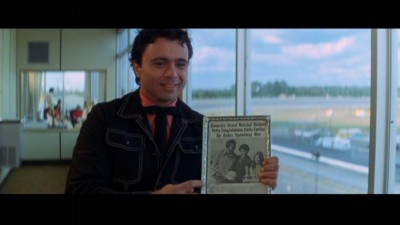
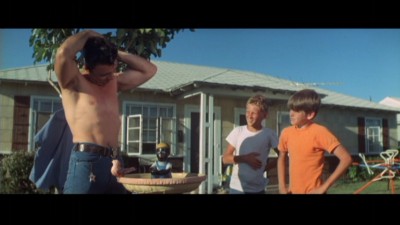
Corky, shot in the fall of 1970, was in production when Hollywood was green-lighting, shooting, and releasing a mini-boomlet of similarly-themed, higher-than-normally-profiled auto racing flicks, including Paul Newman's Winning, Steve McQueen's Le Mans, Jeff Bridges' The Last American Hero, Richard C. Sarafian's Vanishing Point (technically not about racing...but close enough), and Monte Hellman's Two-Lane Blacktop (you could even include Robert Redford's motorcycle opus, Big Fauss and Little Halsey, which has a vibe--and an anti-hero--very similar to Corky's). And out of all those familiar titles, Corky most certainly has to be the one that's the most obscure...which isn't surprising when you read up on its history. Accounts vary widely over the specific details of what, exactly, happened to Corky, but there's some consensus on the generals. Mission: Impossible and Mannix producer Bruce Geller co-wrote Corky's screenplay--originally titled Going All Out--with scripter Eugene Price (Justine, The Game People Play); it was green-lighted by M-G-M's studio head James Aubrey. Aubrey, the former famed CBS TV executive, had recently taken the reins of the crumbling, debt-ridden glamour studio and had slashed its production schedule, favoring instead pick-ups and cheap actioners like Skyjacked and Shaft and Corky, over expensive Metro duds like Goodbye, Mr. Chips and Ryan's Daughter. TV vet Leonard Horn, a friend of Geller's who had, among other projects, successfully directed the pilots for Mannix and Ironside, was picked as Corky's helmer. Shooting commenced in the fall of 1970 in Texas and Georgia on a shoestring $1.5 million dollar budget, and Lookin' Good, as Going All Out was now known, was completed by mid-November.
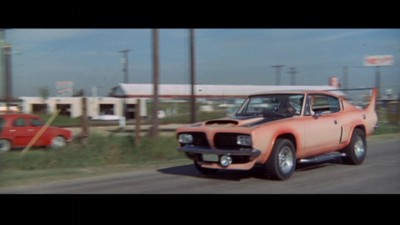
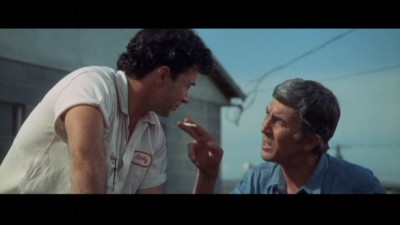
And that's when the trouble started. Apparently, Geller found out that Aubrey, who obsessively watched all the Metro dallies, hadn't like what he was seeing with Lookin' Good, nor did Geller's subsequent first rough cut change his opinion. Geller then took the movie to New York and showed it privately to some critics who indicated the initial results were solid. None of this mattered a bit to Aubrey, who took Lookin' Good (neither Geller nor Horn had the right to final cut), renamed it Corky, and slashed almost ten minutes out of it (including eliminating all scenes with co-star Roddy McDowall), rearranging scenes along the way (including changing the ending), and rescoring it. And then...Aubrey sat on Corky for months and months. Geller hit the roof, and took his beef to the press, telling critics that should Lookin' Good ever come out, it "wasn't his movie any more"...but he certainly wasn't alone in this. The abrupt, arbitrary Aubrey, known by this point in the industry as "the Smiling Cobra," had in his short time as the head of M-G-M alienated and angered countless producers and directors and actors in Hollywood, from cancelling a massive Fred Zinnemann project literally days before principal photography began, to cutting up and rearranging anything that crossed his desk that had Leo the Lion on it. Artists including Geller who went public with their complaints--an almost unheard of breach of established etiquette at that time in closed-mouth Hollywood--included Blake Edwards (Wild Rovers), Robert Altman (Brewster McCloud), Michael Laughlin (Chandler), Robert Mitchum (Going Home), Cornel Wilde (No Blade of Grass), and Michael Clinger (Get Carter). When Corky finally did get a minor, dribbling-out release in March, 1973 (almost two and half years after it was shot), it received mostly negative reviews, which prompted co-scripter Price to get in on the act and bitch to the press that Geller was misrepresenting his lack of screen credit for the script, with Price claiming that the Writers' Guild had taken Geller's name off as co-scripter, and not because Geller requested it taken off because of Aubrey's tampering. The box office was pathetic, and the movie was eventually pulled. It aired once on CBS in 1975, and then disappeared for decades (to my knowledge it was never released on VHS).
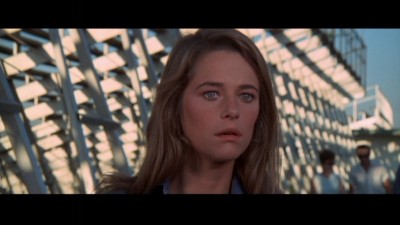
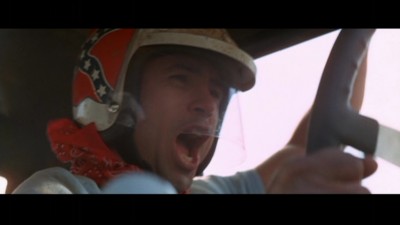
After reading that troubled production history, the burning question is: whatever did happen to Corky, was it the post-production mangling that caused it to sink, or did its downbeat subject matter (...or lack of big stars, or goofy marketing campaign, or its car racing genre--always problematic at the box office) doom it from the beginning? Obviously, it's impossible to say at this point, since, for comparison, those missing 9 minutes (as well as, one would assume, the original editing sequence of Geller's first cut) are M.I.A. (that missing footage isn't on this DVD, at least, which clocks in at the Aubrey-imposed 88 minutes). So, conjecture aside for what might have been, you have to judge Corky for what's sitting in front of you (apparently, some critics who reviewed the final product in '73, aware that it had been altered--Los Angeles Times' Kevin Thomas for instance--still liked it).
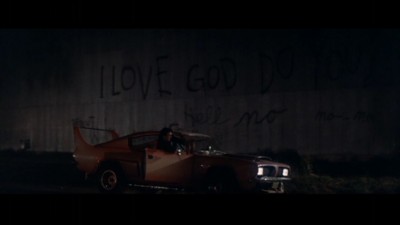
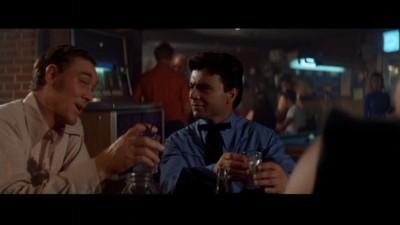
So...is Corky some kind of mangled, forgotten masterpiece, waiting for rediscovery? No...but it's an commendably sustained loser nightmare that gets its atmosphere and details just right, anchored by Robert Blake's intense turn. What grabbed me with Corky was its absolute refusal to make us like its thoroughly unlikable lead character. Rooting for such an insufferable, miserable sh*t who never gets the clue, isn't possible in Corky, even though we've been programmed through countless American "anti-hero" movies to pull for this kind of irrepressible bad-boy to see some kind of light, and then redeem himself in even the smallest way. Having Blake in the role makes Geller and company's total negativity feat all that more impressive, because the innately charismatic Blake is the underdog actor to end all underdog actors, who managed to pull off the impossible task of making us feel sorry for no less than a miserable excuse for a human being than real-life murderer Perry Smith, in Blake's most enduring big-screen outing, In Cold Blood. And yet here, Blake can't raise in us a smile or a laugh or even a sympathetic shrug no matter what he does--even during the unfunny "comic" scenes (drunkenly riding a cow or playing grab-ass with Connelly).
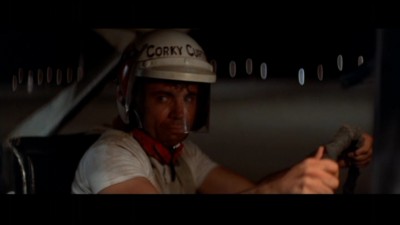
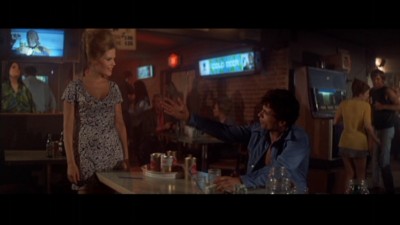
Blake's boastful, cocksure, irresponsible Corky is pegged in the opening scene, and he's given no respite for the next hour and a half. In his first scene, he's letting his little son steer his beloved 'Cuda (my old man did that too...but in a parking lot, not on a highway), before he tunes out his worried wife's pleas to ignore the guy next to them challenging Corky to a drag--a dangerous, potentially deadly drag Corky wins without a care for his passengers: his best friend, his wife, his toddler son and his baby boy. Back home, in the front yard of his tiny, bare-bones tract house, Corky lovingly fusses over his expensive car, while showing off his muscles for the two adolescent neighborhood boys who gawk at the "famous" race car driver's older, masculine assurance. Instead of going in himself to care for his screaming infant son (while Peggy Jo grabs a fast shower), Corky sends one of the boys into his house to look at the framed picture taken years ago of Corky standing next to honorary grand marshal Richard Petty, after Corky won a minor race. Washing his car, and showing off to two young neighbors, means more to Corky than taking care of his own family. And that news clipping from the past is the only proof Corky needs that someday he's going to be big.
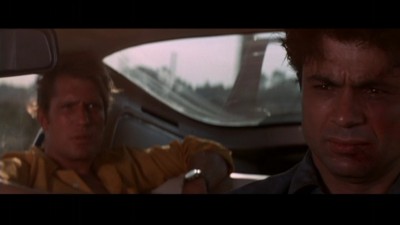
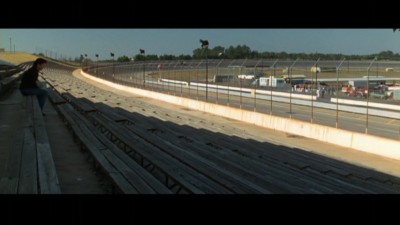
From this point on, the moviemakers metronomically deliver scene after scene that further puts us off Corky, as his character becomes ever-more obnoxious, ever-more obtuse, and ever-more violently self-destructive. At work his coworkers are leery of such a braggart (the kind that calls the boss' car his own, just because he drives it). Corky can't put the economic safety of his family first, either, when his sympathetic boss actually offers him a raise, as well as a face-saving option of being back-up driver, for Corky's disappointment at getting demoted. Instead of being grateful, he vindictively schemes to injure his rival, engineering a wreck that could have killed Steve--the last straw for his finally fed-up boss, who punches Corky and fires him for good. Like a coward, Corky leaves his wife and kids flat (we don't even get a scene of him saying goodbye to his boys), without any money, and apparently with no shame, either, considering his high spirits when calling on Billy to join him in his cross-country lam-out. When things get tight on the road (he has to sell his tools piecemeal for gas and cheeseburgers), Corky still can't win for losing--he "wins" a race by default (the other drivers flame out), but his cockiness at a sure win (he's waving to the crowd when he should just concentrate on driving) helps blow the engine and he crosses the finish line ass-backwards and humiliated (the track owner, Luckinbill, refuses to give him the prize money, just the trophy...which Corky pawns for .50 cents). Cannibalizing his car as they travel East, he's willing to almost commit an assault on a black junk yard dealer who won't give him enough money for Corky's spare tire (Corky then takes his anger out on a random driver--also black--by running his Cadillac off the road, to Billy's horror). Corky can't even accept a kind offer of help from a passing hippie ("Get your Communist ass outta here!" Corky screams) when his 'Cuda conks out, almost hitting the hippie before he takes out his frustration and disappointment on his best friend Billy, who finally sees the light about Corky and leaves him, then and there, by hitching a ride with the long hair (a nice break from what we expect here--we think Connelly's going all the way with Blake).
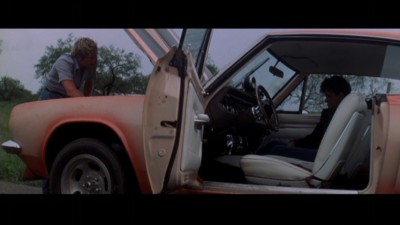
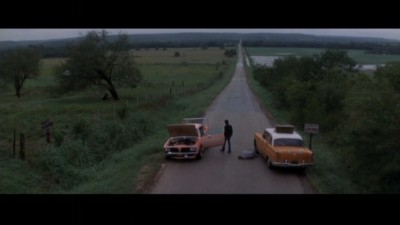
The final degradation to Corky's illusions come when, disheveled and asleep in his now beat-up car, he's peered at again by two young boys, but this time not in awe, like his young neighbors did at the movie's beginning, but now by two strangers with a disinterested curiosity at the sight of such a human wreck. When Corky here unwisely tries to recreate the clowning relationship he had with his neighbor boys--this time innocently swimming in his underwear with the two skinny-dipping boys--he's drawn down upon by the boys' older brother, who's bearing a shotgun and angrily calling Corky a "queer." The angry, frightened brother forces a shamed Corky to leave without his clothes. With literally nothing left, he returns to Peggy Jo, who wants no part of him. She stayed. She persevered. She protected her family, while he ran out on them and then failed. Again. And not only that...she improved with him gone (she gets two jobs, and studies at night school). The only thing left for Corky, in his arrested development, is to lash out in senseless violence (I won't spoil the ending, but the moviemakers continue their relentless vision for Corky, whose final insensible, deadly actions are completely without cathartic release for an audience that's frankly sick to death of this repulsive creature). The closest we get to genuine sympathy for Corky comes briefly before this nihilistic finale, when Corky makes it to Atlanta. Insisting to the track's general manager (a gently dismissive Paul Stevens) that he knows Richard Petty, the manager actually calls "The King" on the phone. Of course Petty doesn't remember Corky at all, but Corky can't hear the truth of Stevens' words ("Young man, you ought to be able by now to figure out how many pictures like these Richard stood still for,"), because Corky never wised up to how marginal was his own brief flirtation with minor "fame" (watch the casual disdain Buddy Baker registers for Corky, nosed pressed against the glass as he watches these immaculate, white-suited Gods of the Track...before he turns his back on the gawker). And yet, when Stevens kindly offers the desperate, penniless Corky a sure thing--an introduction for a mechanics' job--Corky spurns it. He wants his fantasy of being a top driver...or nothing. Our basic sense of pity for an animal in pain is wasted yet again on Corky.
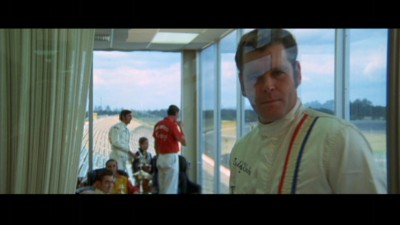
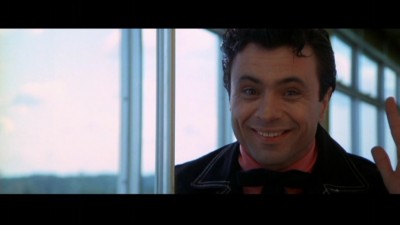
Just on that visceral level of an inexorable, ever-constricting nightmare, Corky works quite well; by the last act of the movie, when nothing is going according to our own genre convention expectations, you feel a palpable sense of dread for what Corky is doing to himself. You know he's not going to pull out of his spin. That sustained vision, though, is why we ultimately feel less-than-fully satisfied with Corky: the subtext doesn't match the atmosphere and details. In other words: we never actually find out why Corky is the way that he is...and from some of the things I've read, those "whys" could very well have been in the ten minutes hacked out of Geller's first cut. That hole in Corky's motivations is the major stumbling block keeping Corky from being a first-rate sleeper. We admire Geller's rather dispassionate, persistent examination of Corky's descent...but it's compelling observation without deeper context.
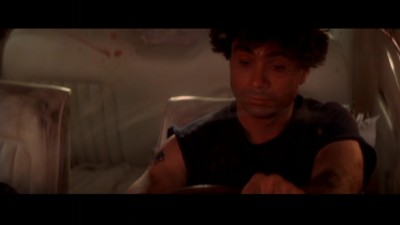
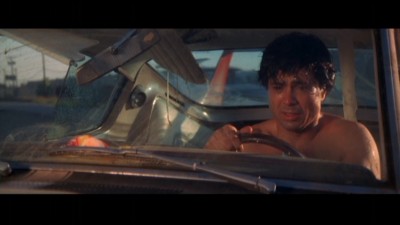
Other elements are problematic to be sure, but they're not on the level of that deal-breaker. The editing can be choppy as hell (the Aubrey factor?). Potentially interesting scenes end before there's any kind of satisfying pay-off, and good actors suddenly appear for a minute or two and then disappear, never to be seen again: Ben Johnson in particular, and Lawrence Luckinbill (several times, Blake and Connelly show up with cuts and bruises...and we didn't see the fights). The flashback structure, complete with goofy, cliched, "wavery underwater" music cues, is laughably old-fashioned, and worse, uninformative (often, they make little narrative sense--why do we need to see Corky putting on a wig in a store?). The music cues are sometimes jarringly out of place (paging Mr. Aubrey), with these big, jazzy Elmer Bernstein-ish flourishes that make good scenes laughable (Blake's and Connelly's fistfight, instead of being tragic, now "sounds" like an '50s AIP drive-in opus). The mismatched, stock sound effects are giggle-inducing, as well (those screeching, cartoony tires you've heard in hundreds of movies and TV shows). There are hiccups in the casting, too; while O'Neal may have been born down South, his subsequently established on-screen persona--silky, sneering, East Coast sophisticate--works against his turn here as an understanding, compassionate Texas repair shop owner. Considering the startling appearance of Britisher Rampling's name in the credits...your guess is as good as mine as to what, exactly, she's doing here--strikingly beautiful, to be sure, but that verkakte cornpone accent is laughable (every time she attempts, "Corky," I hit the floor). As for Blake, Corky came along right when he should have been in a sweet spot in his career, after his star-making turn in In Cold Blood. However, his follow-up, 1969's Western, Tell Them Willie Boy Is Here, didn't make any waves with ticket buyers or critics, with the subsequent Corky debacle not exactly helping matters, either (his two actioners that then followed--cult favorites Electra Glide in Blue in '73 and 1974's Busting--did zip for him, as well, until TV's Beretta ultimately resuscitated his career). Here in Corky, Blake pulls off the neat trick of creating an anti-hero "bad boy" with absolutely zero magnetism or appeal. Seemingly charming at first glance in his cocky confidence and bravado, it only takes a minute to see who Corky really is: an arrogant, frustrated manipulator who's interested in no one but himself, who uses flash and forced laughter to get what he wants, and to block what he doesn't want to see in himself--that he's a loser. It's a pretty brave performance that Blake had to know would turn off audiences. It's just a pity we're not seeing all of it here.
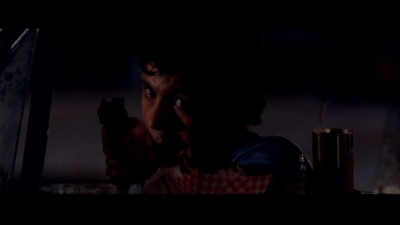
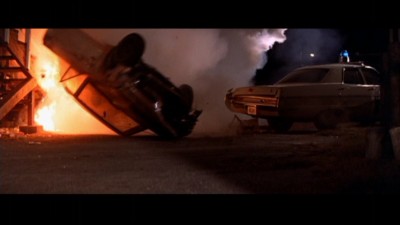
The Video:
The anamorphically-enhanced, 2.35 widescreen transfer for Corky is impressive: bright, crisp, detailed image, nicely-valued color, and few imperfections. A huge improvement over the cropped, grainy, beat-up print I saw on TV years ago.
The Audio:
The Dolby Digital English mono audio track is heavy in this re-record, with little or no hiss. No subtitles or closed-captions.
The Extras:
An original trailer--which sells Corky like a cross between Vanishing Point and Bonnie & Clyde--is included.
Final Thoughts:
An oppressively fatalistic look at a sh*tty little loser. Corky's audience appeal is completely perverse: let's watch a character we wouldn't be caught dead near, spiral down into a nightmarish hole of his own making, with absolutely no chance of his achieving understanding or redemption. It's a powerful vision--it's just too bad it wasn't a bit deeper. Still, Blake's performance is remarkably in tune with the dark, well-detailed proceedings. I'm highly, highly recommending Corky.
Paul Mavis is an internationally published movie and television historian, a member of the Online Film Critics Society, and the author of The Espionage Filmography.


|
| Popular Reviews |
| Sponsored Links |
|
|
| Sponsored Links |
|
|
| Release List | Reviews | Shop | Newsletter | Forum | DVD Giveaways | Blu-Ray | Advertise |
|
Copyright 2024 DVDTalk.com All Rights Reserved. Legal Info, Privacy Policy, Terms of Use,
Manage Preferences,
Your Privacy Choices | |||||||












